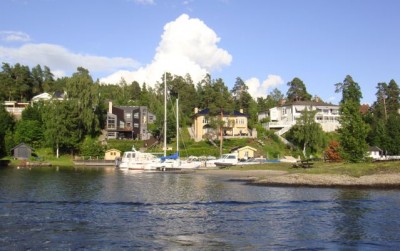Housing prices rose again in Norway last month, to a level that now even worries real estate brokers. Homeowners and buyers, though, enjoy among the lowest property taxes in the world and politicians seem reluctant to raise or even impose them any time soon.

Norway is generally known as a high-tax country, with punitive taxes on products from alcohol to gasoline and a 25 percent VAT that make prices high. A few other taxes commonly imposed in other countries, though, are surprisingly low given the country’s social welfare benefits. Among them, confirms an international comparison conducted by the Organisation for Economic Cooperation and Development (OECD), are those placed on homebuyers and owners.
Newspaper Aftenposten reported Tuesday that a new OECD study shows that homeowners in Great Britain bear the highest property tax burden of all OECD members, paying what collectively amounts to 4.3 percent of gross national product (GNP). France ranked second, followed by Canada and the US, where property taxes vary by area but amount to 3.2 percent of GNP.
Norway’s property tax burden, meanwhile, ranked fifth from the bottom, behind countries such as Australia, Spain, and Denmark. Norwegians collectively pay property taxes that amount to just 1.2 percent of GNP and that includes the highly controversial so-called dokumentavgift (documentation fee) that homebuyers must pay when a property changes hands. It’s considered stiff, at 2.5 percent of the amount of the purchase price, and never before has the state collected so much on it, given the hot real estate market. Aftenposten reported that homebuyers will pay a total of NOK 7.5 billion into the state treasury this year.

Other property taxes in Norway include the value of a home that’s included in one of the other most controversial taxes in Norway, formueskatt, literally the “fortune tax” Norwegians must pay every year on the annual calculation of their net worth. There’s also a tax on capital gains from the sale of a property in which the seller hasn’t resided for the past two years, and some municipalities have imposed a specific tax on property owners, especially those with holiday homes (hytter). Only 45 percent of Norway’s local governments had imposed such a tax by last year, though, and it generally involves a low percentage of assessed value, not market value.
State tax collectors recently have been raising the overall “tax value” of property with the aim of making sure all owners of Norwegian property are assessed at a level based on 25 percent and no more than 30 percent of market value, for purposes of calculating the fortune tax. Before the increases began, it wasn’t uncommon that owners of property that had risen sharply in market value were still assessed at much lower levels.
On Monday came reports that overall housing prices in Norway, which have risen faster than those in other OECD countries, rose again in August and are now an average of 8.1 percent higher than in August of last year. The latest rise is once again linked to historically low interest rates and heavy demand, with the average price per square meter rising to NOK 30,500 on a nationwide basis and the average price of a home rising to just under NOK 3 million (USD 500,000). In many of Norway’s cities, especially Oslo and Stavanger, prices are much higher and routinely amount to more than NOK 60,000 per square meter.
Several economists think the state should impose higher property taxes, both to cool down the housing market and make it easier for first-time buyers to afford a home, and to raise state revenues. In the US, Great Britain and South Korea, for example, the state receives around 12 percent of total revenues from property taxes. In Norway, the state takes in only 2.8 percent of its revenues from property taxes, compared to an average of 5.5 percent elsewhere in Europe.
“But home ownership is sacred in Norway, and low property taxes have been a mantra in Norwegian politics since World War II,” Professor Ola H Grytten at business school NHH in Bergen told Aftenposten. “Therefore no one dares to touch this kind of tax.” He worries, though, that the low property taxes add to speculation in the real estate market that drives prices “artificially high and makes it difficult for people to enter the market.” Grytten also noted that “much too much” of Norwegians’ savings “ends up in real estate investments.”
Tax deductions allowed on the full amount of interest paid on debt also creates a tax advantage for home ownership and long has left many Norwegians asset-rich and cash poor.
Professor Ole Gjems-Onstad at business school BI also notes that property taxes are a sensitive issue and prompt anxiety because their size isn’t related to individual income or liquidity. “Therefore some feel they’ve lost control,” Gjems-Onstad told Aftenposten.
While higher property taxes could be healthy for the Norwegian economy, especially if they replaced other more regressive taxes, it’s unlikely they’ll be imposed. “Politicians in Parliament are too cowardly,” claims Bjørnar Moxnes, leader of Norway’s most left-wing party, Rødt. “People with large and expensive homes should pay more tax than they do today, with the extra money used for more government-regulated housing construction.” Many see how that would be reasonable, he believes, but none of the other parties represented in Parliament have proposed any property tax increases in their platforms.
Views and News from Norway/Nina Berglund
Please support our news service. Readers in Norway can use our donor account. Our international readers can click on our “Donate” button:

